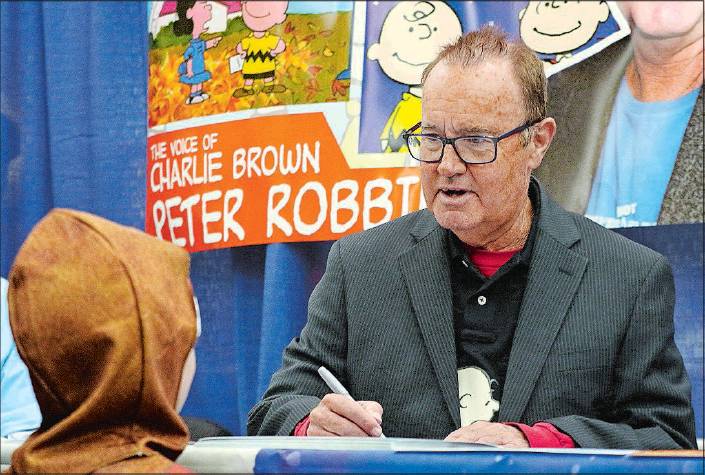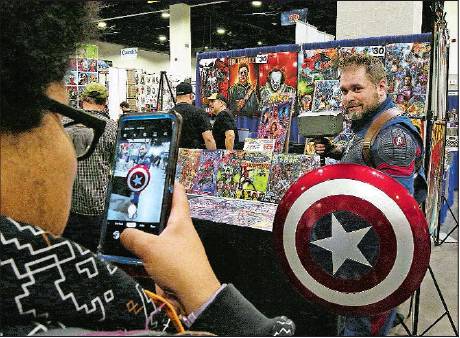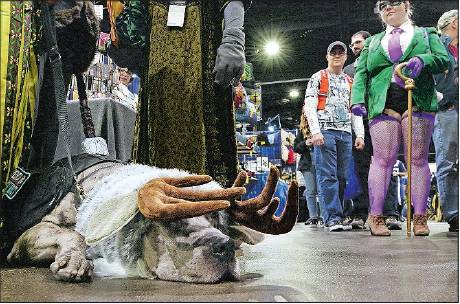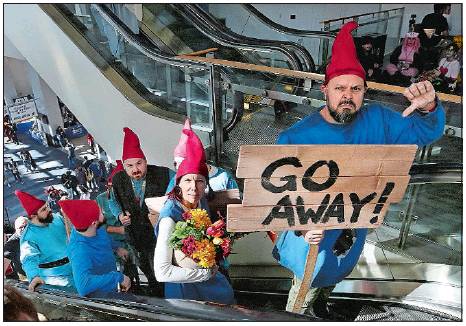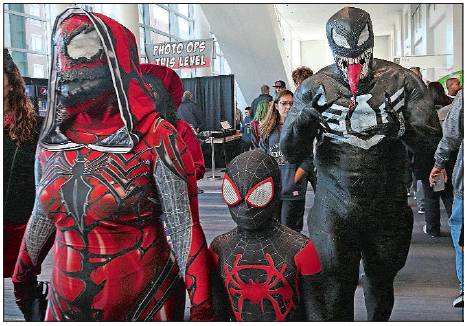RHODE ISLAND COMIC CON
Life’s been far from comic for Charlie Brown actor
After struggles with addiction, mental illness and prison, Peter Robbins finds redemption in the cartoon character he voiced at age 9
By Kevin G. Andrade Journal Staff Writer
PROVIDENCE — In the Rhode Island Convention Center ballroom on Saturday morning, across the crowded corridor from where the cast of the 1990s sitcom “Family Matters” was greeting fans during Rhode Island Comic Con, a short, older man wearing a Charlie Brown shirt stood at a booth when a young boy approached with his mother.
“How old are you?” asked Peter Robbins, the 63-year-old who first voiced the title character in 1965’s “A Charlie Brown Christmas.”
“Nine,” he said.
“That is exactly how old I was when I first voiced Charlie Brown,” Robbins responded. “Now you need to go out and get a job.”
“That’s what I need to get now, too,” he added, before signing a picture and handing it to the family.
Robbins’ life has had its twists and turns. But through it all, one constant has kept his spirits up, even in the worst of moments.
“I am alive today, in part, because of Charlie Brown,” he said, ensconced in a fluffy blue armchair during an interview in his room at the Graduate Providence. “You would not be doing a news story about me if I were not the voice of Charlie Brown.”
Robbins was born Louis Nanasi in Los Angeles in 1956 to parents who were refugees from Hungary in the aftermath of World War II.
Nanasi became Peter Robbins when he began auditioning for roles in Hollywood, shortly before he was picked to be the first voice of Charlie Brown in the Peanuts Christmas special.
“The opening [of the special] is very profound,” Robbins said, “when Charlie Brown looks at Linus and says, ‘There has to be something wrong with me, Linus.’”
“How could there be something wrong with a 9-year-old boy?”
In his adult years, long after he stopped voice acting — his last round with Peanuts happened just before his voice changed around age 14 — Robbins would find himself in trouble.
He began seeking out escorts and got wrapped up in prescription drug abuse and alcoholism. He eventually started dating one woman steadily, and that relationship led to a series of legal troubles and jail stints beginning in 2012.
“I made a bunch of stupid, criminal threats in 2012,” said Robbins, who lives with bipolar I disorder.
The threats involved his girlfriend at the time, Shawna Kern, and a plastic surgeon who had performed Kern’s breast-implant surgery.
Robbins was also charged with threatening a sheriff’s deputy on Jan. 13, 2013.
The court permitted him to serve time in a treatment center in lieu of a one-year jail term, but by 2015, he had violated his probation by drinking alcohol, smoking marijuana and failing to complete court-mandated domestic-violence classes.
The drug and alcohol use got him kicked out of the mobile home where he lived. While in custody after violating his probation, he was ordered to undergo a mental health exam after an outburst in a San Diego courthouse.
In December 2015, Robbins was sentenced to four years and eight months as part of a plea agreement regarding charges related to threats he made against the mobile home park’s owners.
That, he says, is when his true ordeal began.
Robbins said that racial politics in the California penal system caused several problems for him.
“If you do not play ball with [the prison gangs], bad things happen,” he said. “Once, the white gang blanket-partied me for going to a Catholic Mass with the Mexican group.”
Blanket party is slang for when someone’s face is covered with a blanket while a group is beating them.
Another time, he demanded a man in the prison yard put his shirt on to cover a large swastika tattoo on his chest.
“I told him to cover it up,” he said. “My grandfather died because of the Nazis.”
Toward the end of his sentence, his issues with bipolar disorder as well as paranoid schizophrenia got him transferred from the California Institution for Men in Chino to Atascadero State Hospital.
“My five years in prison were a true trip through hell,” Robbins said. “At the end, I was successfully paroled into the hospital, where for the first time in my life I received treatment.
“I spent four months in [Atascadero] tweaking the right medication, and since I have been on that medication, my life has turned around.
Robbins said he moved into a sober-living home in the San Diego area after his release and needs special permission from his parole officer to make trips, such as to Providence, where he signs autographs to earn a living.
“This is my comeback convention,” he said. “This is my testament that parole works. Going to anger management works. Taking the proper medication works.”He noted that there were several parallels between himself and his fictional counterpart.
“The credit goes to the man who is actually in the arena, and fails time and time again, like Charlie Brown, to kick a football,” he said. “But it will never be with those timid souls who neither know the thrill of victory or agony of defeat.
“That is why Charlie Brown is such a wonderful character,” he added. “He does see a psychiatrist, so he knows he has got some problems and he is trying to get help. They always say that Charlie Brown is a lovable loser but, at the end of the day, he gathers everybody around the tree.”
Robbins ended the interview by noting Linus’ comments upon seeing the bare, sickly tree in the Christmas special.
“Linus said that all it needs is a little love,” Robbins said. “Maybe that’s what we all need.
“Even though we are quirky. Even though we are depressed. That is what Charlie Brown represents, but at the end of the day ... love.”
— kandrade@ providencejournal.com
(401) 277-7646
On Twitter: @Kevprojo
